Marchés
Lors de la conception d’une intervention humanitaire et de la prise de décisions quant à l’utilisation des transferts monétaires, l’analyse générale des options de réponse doit inclure une analyse de marché. Il est prouvé qu’offrir un soutien ciblant le fonctionnement des marchés accélère la reprise et accroît la résilience dans les zones affectées par une catastrophe.
De nombreuses organisations ont investi dans la mise au point d’outils visant à faciliter l’analyse de marché et réfléchissent à la mise en place de programmes basés sur les marchés plus holistiques. Elles envisagent des interventions tirant profit du marché (basées notamment sur des transferts monétaires aux populations affectées), ainsi que des interventions soutenant directement les marchés (comme l’octroi de subventions conditionnelles aux vendeurs/euses pour la remise en condition du marché).
Initiatives associées
Contenu associé

1.2 Introduction à l’analyse de marché
Cours
Ce cours de 30 minutes offre une introduction à l’analyse de marché pour les contextes d’urgence. Il contient des contributions d'experts dans ce domaine. Ce cours a été développé en collaboration avec l'International Rescue Committee et le CALP Network et grâce au financement d’USAID/OFDA et de l’Agence Suisse pour le Développement et la Coopération. Il est destiné aux...

2.4 Un guide pratique pour l’analyse de marché
Cours
Ce cours en ligne de 3.5 heures vise à fournir aux équipes qui conduiront des analyses de marchés en contextes humanitaires une compréhension approfondie de la théorie et des étapes à suivre afin de leur permettre de comprendre le pourquoi et le comment du processus à suivre. Les participants seront guides à travers un scenario d'analyse de marchés d'urgence. Ce cours s'appuie sur...
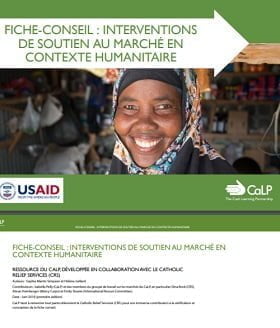
Fiche-Conseil : Interventions de soutien au marché en contexte humanitaire
Guides et outils
La fiche conseil définit le programme de soutien au marché en contexte humanitaire et le décrit dans la pratique. Elle permet aux praticiens humanitaires d’envisager systématiquement des interventions de soutien au marché, parallèlement à d’autres activités du programme. Le champ d’application comprend des interventions de soutien au marché axées sur l’offre/la disponibilité...
Thematic lead
Latest

Cash grants in Upper Sindh flood response 2010
Case Study
This case study and paper summarises Oxfam’s experience with unconditional cash grants to 20,000 households in response to the flooding in Upper Sindh, Pakistan in 2010. It retrospectively documents the Oxfam project, emphasising issues relevant to a wide practitioner audience interested in experience...
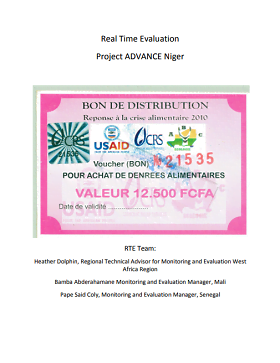
Real Time Evaluation: Project ADVANCE Niger, Final Report
Report
The 2009 agricultural season in Niger was marked by dramatic crop production deficits. The most recent drought in Niger has led to an escalation in the price of locally-produced staple grains in the region. While demand in local markets remains high, as is normal right before the lean season, many...
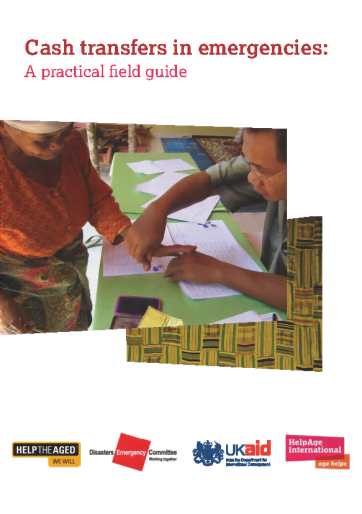
Cash transfers in emergencies: A practical field guide
Guidelines and Tools
A practical and user-friendly field guide for using cash to meet the needs of older people. This guide covers deciding if cash is appropriate, conducting initial assessments and market analysis, identifying beneficiaries and amounts, preparing the community and implementing cash transfers. The purpose of...

Guidelines for cash interventions in Somalia
Guidelines and Tools
These guidelines are intended for all agencies operating in Somalia to represent a common approach to cash transfer programming for food security and livelihood activities in Somalia. The guidelines outline the minimum acceptable standards for cash interventions and provide the justification for...

Rapport de l’évaluation mi-parcours de cash transfert dans le département de Magaria
Rapport
Ceci est un rapport de mi-parcours d’un programme de transfert monétaire qui a eu lieu en 2010 au Niger. Afin de protéger les enfants contre la malnutrition et préserver les moyens de subsistances, Save the Children a proposé d’implémenter un projet de cash transfert visant 2683 ménages très...

Minimum Economic Recovery Standards
Guidelines and Tools
The Minimum Economic Recovery Standards articulate the minimum level of technical and other assistance to be provided in promoting the recovery of economies and livelihoods affected by crisis.

Rapport de l’évaluation mi-parcours de cash for training dans les départements de Tessaoua et Aguié
Rapport
Ceci est un rapport de mi-parcours d’un programme de “cash for training” (argent contre formation) qui a eu lieu en 2010 dans les départements de Tessaoua et Aguié au Niger. Le rapport résume les objectifs, les résultats attendus et la situation du marché, et fourni des données...

Responding to High Food Prices: Evidence from a Voucher Programme in Burkina Faso
Report
In February 2009, WFP launched its first food voucher operation in Africa, to address food security in an urban environment where food is available but beyond the reach of many because of high food prices. Vulnerable segments of the population, who were spending most of their budgets on food, risked...

Comparing Cash and Food Transfers: a Cost-Benefit Analysis from Rural Malawi
Report
The Cash and Food for Livelihoods Pilot (CFLP) project was a cash and food-for-assets scheme implemented in southern Malawi over the eight months from October 2008 to May 2009, benefiting 11,100 households. CFLP was designed to prevent acute hunger and invest in disaster prevention and preparedness...
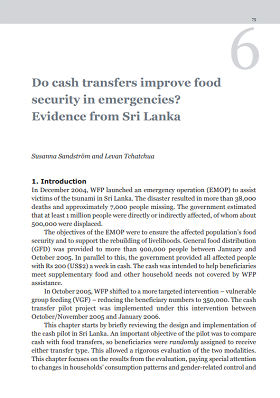
Do Cash Transfers Improve Food Security in Emergencies? Evidence from Sri Lanka
Case Study
In December 2004, WFP launched an emergency operation (EMOP) to assist victims of the tsunami in Sri Lanka. The disaster resulted in more than 38,000 deaths and approximately 7,000 people missing. The government estimated that at least 1 million people were directly or indirectly affected, of whom about...

Enterprise Recovery Following Natural Disasters
Report
Using data from surveys of enterprises in Sri Lanka after the December 2004 tsunami, the authors undertake a microeconomic study of the recovery of the private firms in a developing country following a major natural disaster. Disaster recovery in low-income countries is characterized by the...

Understanding and Strengthening Informal Seed Markets
Report
Informal markets receive little attention from governments and researchers, despite their centrality to farmers’ seed security. This paper documents the importance of informal markets for supplying seed and restocking critical plant genetic resources in normal and stress periods. It analyses farmers’...
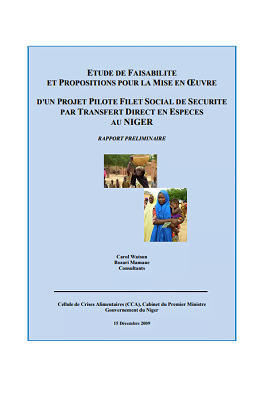
Etude de faisabilite et propositions pour la mise en oeuvre d’un projet pilote filet social se securite par transfert direct en especes au Niger
Rapport
L’objectif de cette étude est d’analyser la faisabilité de la mise en oeuvre au Niger d’un projet pilote de transfert direct en espèces qui aura pour but la réduction de la pauvreté et de l’insécurité alimentaire et de formuler des propositions opérationnelles pour sa mise un place. A...
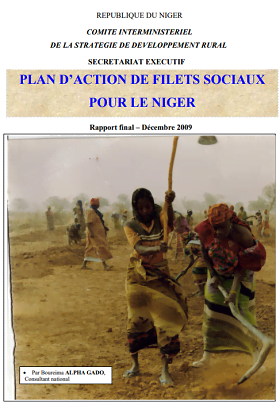
Plan d´action de filets sociaux pour le Niger
Rapport
Ce travail résulte d’un certain nombre de missions de suivi d’une étude sur « La sécurité alimentaire et les filets sociaux » effectuées au Niger en 2008. Il s’agit d’approfondir la réflexion sur les questions essentielles relatives à l’élaboration d’une stratégie de sécurité...
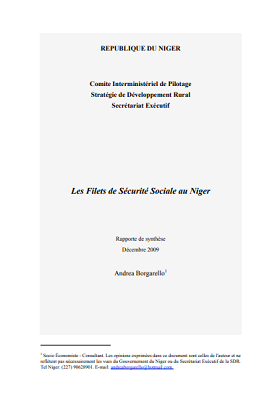
Les Filets de Sécurité Sociale au Niger
Rapport
L’étude a été commandite par la Cellule de Crises Alimentaires (CCA) du Cabinet du Premier Ministre, qui a délégué le Secrétariat Exécutif de la Stratégie du Développement Rural à la supervision. Il fait partie d’une série d’études coordonnées par un comité national de pilotage et...

Cash Transfers in Post-conflict Contexts
Report
This ODI project briefing looks at the implementation for the design of cash programmes in post-conflict or fragile states, compared to those of peaceful and stable countries. It highlights examples from Sierra Leone and Nepal drawing lessons from existing programmes, examines the contribution to poverty...
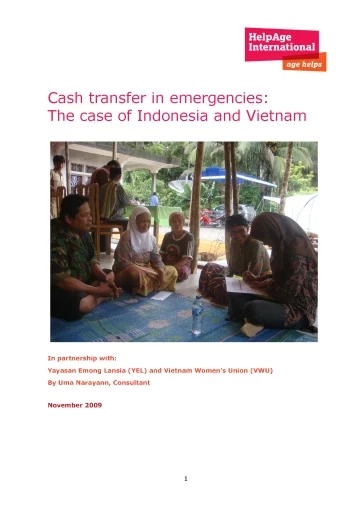
Cash Transfers in Emergencies: The case of Indonesia and Vietnam
Case Study
In October 2009, typhoon Ketsana brought heavy rains over Vietnam causing sudden and heavy flooding, which led to considerable loss of lives, shelters and livelihoods. Around the same time, an earthquake measuring 7.2 on the Richter scale struck the island of Sumatra in Indonesia causing massive loss of...
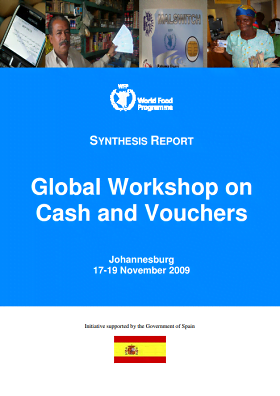
WFP Global Workshop on Cash and Vouchers
Report
This document provides a summary and synthesis of key outcomes and emerging priorities. It also provides a summary of the current status of voucher and cash programming in WFP. A discussion of key emerging cross-cutting issues follows. Strategic priorities for WFP voucher and cash programming and policy...
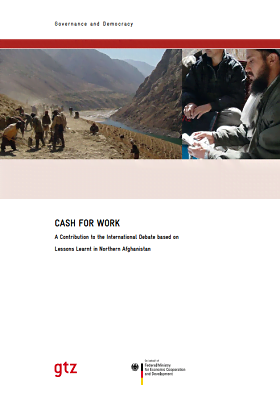
Cash For Work: A Contribution to the International Debate based on Lessons Learnt in Northern Afghanistan
Case Study
The purpose of this study was to document learning from BMZ finance cash for work (CFW) projects implemented by GTZ in Afghanistan as a contribution to international debates about cash transfer approaches. The operations of the GTZ CFW scheme in Northern Afghanistan are financed by the German Federal...
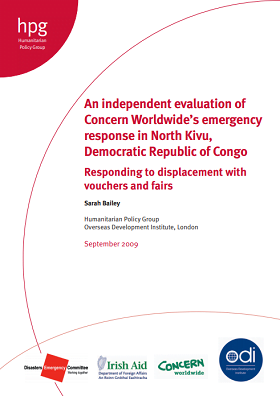
An independent evaluation of Concern Worldwide’s emergency response in North Kivu, Democratic Republic of Congo: Responding to displacement with vouchers and fairs
Case Study
In late 2008, escalated fighting among rebels and the Congolese Armed Forces (FARCD) provoked renewed and widespread displacement in North Kivu province, Democratic Republic of Congo (DRC). In response to the unfolding crisis, Concern Worldwide implemented the project Emergency Assistance to Newly...
